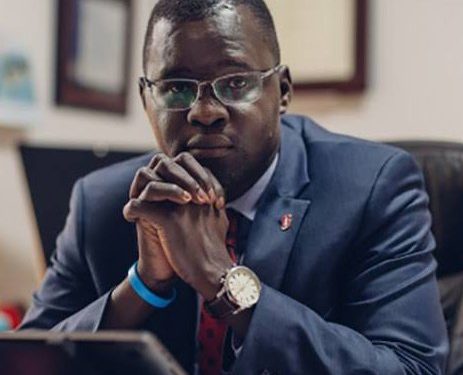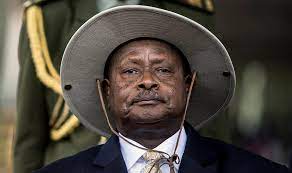Uganda: Widespread condemnation greets passage of anti-homosexuality bill
Colin Stewart is a 45-year journalism veteran living in Southern…
International appeals urge President Yoweri Museveni to veto it.

By Joto La Jiwe
The Anti-Homosexuality Bill 2023, passed nearly unanimously Tuesday by the Parliament of Uganda, is being celebrated as a huge victory for the homophobes who have spent sleepless nights painting members of the LGBTQI+ community in Uganda as outlaws who should be banished or killed.
To pass it legitimately, the bill’s supporters needed a quorum of at least 176 members. In fact, a total of 389 lawmakers were present in person, with about 55 MPs following proceedings on Zoom technology.
When the question was put, there was no doubt that the ayes would have it, especially after the Speaker of Parliament, Anita Among, openly and aggressively pushed for passage of the bill.
The bill supplants an existing but largely unenforced anti-homosexuality law that, on paper, calls for life imprisonment for sexual activity “against the order of nature”.
“This House will not be shy,” the Speaker tweeted shortly after the new bill was passed. “The House recognizes, protects and safeguards the reigning will, norms and aspirations of the people of Uganda.”
Under the provisions of the bill — if it is signed by President Yoweri Museveni and withstands any legal challenges — the Parliament’s website states that:
- An individual convicted of committing the offence of homosexuality (presumably meaning same-sex sexual activity) would be sentenced to life in prison.
- A person convicted of attempting to commit that act would be sentenced to seven years in prison.
- A legal entity convicted of promotion of homosexuality would be fined 1 billion Ugandan shillings (about U.S. $266,000)
- A child convicted of homosexual activity would be imprisoned for three year.
In addition:
- A person convicted of “aggravated homosexuality” would face the death penalty. That would apply to repeat offenses and cases of homosexual rape and homosexual activity involving a child, a person with disabilities or incest.
Condemnation from human rights defenders
As the framers, promoters and supporters of the bill rejoiced, human rights defenders condemned the bill.

Nicholas Opiyo, an award winning Ugandan human rights defenders, said;
“History will be harsh to those who are hateful, vengeful and homophobic/transphobic”.
He added:
“The day after is here. The question is whether the executive will rise above the performative actions of the MPs & ratify the extreme and hateful condemnation of a section of our community purely because of their sexual orientation or gender identity”.
Adrian Jjuuko, the executive director of Uganda’s Human Rights Awareness and Promotion Forum (HRAPF), a legal aid organization, stated:
“The death penalty is back — essentially these MPs are dancing on the graves and sufferings of LGBTI persons. What was so amusing as they blatantly passed a law that criminalizes the very existence of a section of the population?”.
Volker Türk, the U.N. High Commissioner for Human Rights, urged Museveni not to sign the bill. He declared in a statement from his office:
“The passing of this discriminatory bill – probably among the worst of its kind in the world – is a deeply troubling development.
“If signed into law by the President, it will render lesbian, gay and bisexual people in Uganda criminals simply for existing, for being who they are. It could provide carte blanche for the systematic violation of nearly all of their human rights and serve to incite people against each other.”

U.S. Secretary of State Antony Blinken tweeted that the bill would “undermine fundamental human rights of all Ugandans and could reverse gains in the fight against HIV/AIDS. … We urge the Ugandan Government to strongly reconsider the implementation of this legislation.”
Linda Thomas-Greenfield, U.S. Ambassador to the United Nations, this week spoke twice with Museveni to express “deep concern” about the legislation, according to CNN, citing a U.S. official.
Andrew Mitchell, a member of the British parliament, tweeted:
“The UK is deeply disappointed by the Ugandan Parliament’s decision to pass the Anti-Homosexuality Bill.”
Tigere Chagutah, Amnesty International’s regional director for East and Southern Africa, issued a statement directly addressing President Museveni and calling upon him to reject the bill:
“President Yoweri Museveni must urgently veto this appalling legislation, which was passed following a rushed vote on Tuesday evening. The law, dubbed the ‘2023 Anti-Homosexuality Bill’, amounts to a grave assault on LGBTI people and is contemptuous of the Ugandan constitution.
“This ambiguous, vaguely worded law even criminalizes those who ‘promote’ homosexuality or ‘attempt to commit the offence of homosexuality’. In reality, this deeply repressive legislation will institutionalize discrimination, hatred, and prejudice against LGBTI people, including those who are perceived to be LGBTI and block the legitimate work of civil society, public health professionals, and community leaders.
Instead of criminalizing LGBTI people, Uganda should protect them by enacting laws and policies that align with the principles of equality and non-discrimination enshrined not only in Uganda’s Constitution, but also the African Charter on Human and Peoples’ Rights.”
Other varied responses
Some responses were more whimsical. Lydia Namubiru, a media personality, claimed she was “bemused” by the bill. She tweeted;
“I am more bemused than anything. Wow, there are a lot of really crass people in Uganda’s parliament! As for being recriminalized, well, anyone living in the post-colony can end up in prison any time for any reason. More laws only marginally increase the bad odds.”
Rose Wakikona, a human rights lawyer, tweeted;
“So this country wants to make heterosexuality compulsory.”
Kasiita Mark, a blogger, noted that the bill violates established international and regional human rights standards by unfairly restricting LGBTIQ+ people’s fundamental rights.
Not every MP supported the bill
The bill was rejected by a few members of the Uganda Parliament.
Fox Odoi Oywelowo, the MP for the Budama North East Constituency, and Paul Kwizera, MP for the Kisoro municipality, presented a dissenting minority report to the bill citing duplication of several provisions in the Penal Code Act of 1950 and violations to Articles 28 and 44(c) of the Constitution. They argued that the bill will infringe on the rights of Ugandans to freedoms of expression, association, liberty, equality, privacy, and freedom from discrimination and from inhuman and degrading treatment, among others.
“The Anti-Homosexuality Bill 2023 contravenes established international and regional human rights standards, as it unfairly limits the fundamental rights of LGBTIQ persons,” Fox Odoi said.
Ssemujju Ibrahim Nganda, a journalist and MP representing the Kira municipality, said:
“You can’t criminalize an entire media house because of one person promoting homosexuality. If it was like that, we would have closed the whole of NRM [Uganda’s ruling party, the National Resistance Movement], following the iron sheets scandal [involving misuse of metals and food intended as aid to the undeveloped Karamoja region of Uganda] .”
Ssemujju also expressed concern about the absence of the Prime Minister and several other officials when the vote on the Anti-Homosexuality Bill occurred:
“Tell us why the Prime Minister, her [three] deputies, the Vice President many other ministers are taking cover and hiding.”
Will the President assent to the bill?
Following the passage of the bill, MP Asuman Basalirwa, who introduced the bill on Feb. 28, asked President Museveni to sign it at his earliest convenience before it is subjected to court delays.

“I therefore call upon my colleague in Entebbe to take the signing of this bill as a priority. The gesture he exhibited last time should be the same he exhibits this time so that we don’t come back here when 60 days have elapsed,” he said.
For human rights defenders, the biggest hope of killing this homophobic bill now lies in the hands of the president — a man who signed a similar bill into law back in 2014 (before it was overturned in court) and recently referred to gays as “deviants”.
If the international community led by the U.S and E.U. leaders issue more than just a statement in response, the old man with a hat might go for the veto option. He has lots of ways he could use to justify this course of action. It is unlikely but possible.
Joto La Jiwe, the author of this article, is a Ugandan correspondent for the African Human Rights Media Network. He writes under a pseudonym. Contact him at info@76crimes.com.




Here’s an empowering new song by a queer Nigerian singer